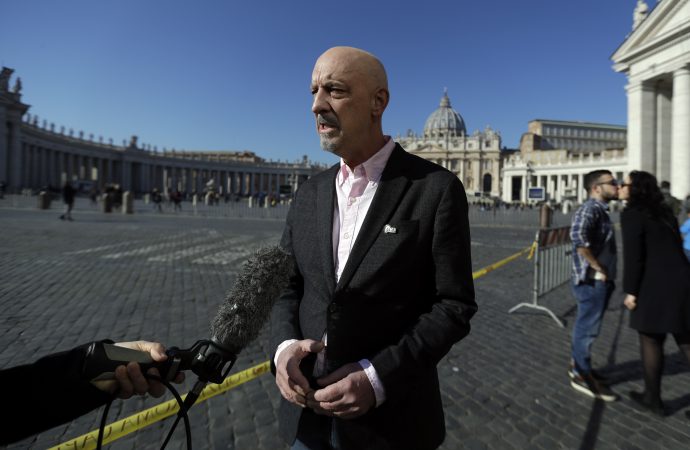One of the most outspoken survivors of clerical abuse says that he wants to see accountability for both the crime and cover-up of clerical abuse, and that if an upcoming summit fails to yield these results, Pope Francis will have failed victims.
“He has to deliver. In my opinion as a survivor, he’s gotta deliver during the summit. If he doesn’t do that, he has really betrayed what he said he has learned from hearing our stories,” Peter Isely, a survivor of child sexual abuse by a Wisconsin priest, told Crux in an interview.
While he and other survivors are hopeful Francis will come through, “we can’t base this thing on hope. Hope is not going to get us there,” he said, explaining that for those who have long endured the devastating impact of abuse, “we base it on justice.”
A longtime outspoken activist and advocate for abuse survivors, Isely was a founding member of the U.S. branch of the Ending Clergy Abuse (ECA) activist group and he was also a founding member and Midwest Director for the Survivors Network of those Abused by Priests (SNAP).
He is in Rome for a Feb. 21-24 summit on the protection of minors in the Church, which was called by Pope Francis to address the global clerical abuse crisis, and which will be attended by the presidents of all bishops’ conferences around the world, heads of religious orders, representatives of Eastern Catholic Churches and abuse victims, among others.
Pegged by many as perhaps Francis’s highest-stakes endeavor to date on the abuse scandals, the summit has been made up to be a sort-of make-or-break deal for Francis on the abuse issue following a tumultuous year in 2018, including a major PR flop in Chile and questions about his own actions in the case of Theodore McCarrick, the former cardinal who was recently defrocked after being found guilty of sexual abuse and manipulation.
In Isely’s view, survivors have typically encountered two different personas in Francis, one being the sympathetic pastor who has a deep sense of the horrifying impact of abuse, and another who can be cryptic, insensitive and who appears to fail to take action against known abusers.
“I don’t think we’ve ever heard someone from the Chair of Saint Peter talk about these crimes the way he has, and the effect and impact it has on the victim,” he said. “But then we’ve got this other Pope Francis.”
“Sometimes he says some alarming things, like he did in Chile,” Isely said, alluding to Francis essentially accusing abuse victims who protested against Bishop Juan Barros on charges that he covered up for Chile’s most notorious abuser priest, of calumny.
“We’ve got this guy who allows these bishops to cover up these crimes. And when a bishop is removed, we know that’s why he’s being removed, but he won’t say that’s why he’s being removed,” Isely said, adding that it’s not yet clear which persona will show up to the summit, but he’s hoping it’s the first.
Noting how Francis and other Vatican personnel have said expectations ahead of this week’s summit are too high, Isely said it is Francis himself who created those expectations, which are especially palpable to victims, by calling the meeting to begin with.
Francis “created that expectation,” Isely said, and by doing so, “he’s asking survivors, ‘trust me’ … That’s really something to be asking a survivor who has been harmed by a priest, who many times has been covered up for by a bishop.”
“He put a spotlight on this, he’s getting all these guys together, so he has a responsibility and an accountability to deliver” not just on those who commit the crime of abuse, but also those who cover it up, he said.
Using the McCarrick case as an example, Isely said there are people who covered up for the former cardinal and priest, and who allowed his ecclesial career to grow even though rumors of his sexual misconduct with priests and seminarians had been an open secret in American Catholicism for years.
The ‘who’ behind the cover-up is still a question many, in the U.S. in particular, are demanding an answer for, and with little response from the Vatican, are growing impatient in their thirst for justice.
“Why is (Pope Francis) covering up for people who have covered up those crimes?” Isely asked, saying it’s not unreasonable for parents who take their children to church and Catholic school to want to know that the priest in charge has not committed child sex crimes.
Under the current Catholic system, “you can do that, and you can remain in ministry if your bishop keeps you in ministry,” Isely said, adding that to lower expectations in this regard “is not acceptable.”
Yet despite the challenges going into the summit, Isely said at least the problem of clerical sexual abuse has been recognized as a global issue, and while not everyone is on the same page about the severity of the crisis, “miracles do happen, and I’m not talking about changing the laws of physics.”
“Justice can seize people. I’ve seen it as a survivor, that moment can come and happen, and there is a consensus now, there is a growing understanding around the world I think, not just in the West, that this has to change…there is a growing and deep understanding now that this system has to change, and that the people who are part of this system are going to have to be a part of this system.”
“We all want a post-abuse Church,” Isely said. “I don’t know what that’s going to look like, none of us know what that’s going to look like, but we know that’s what we want to get to.”

